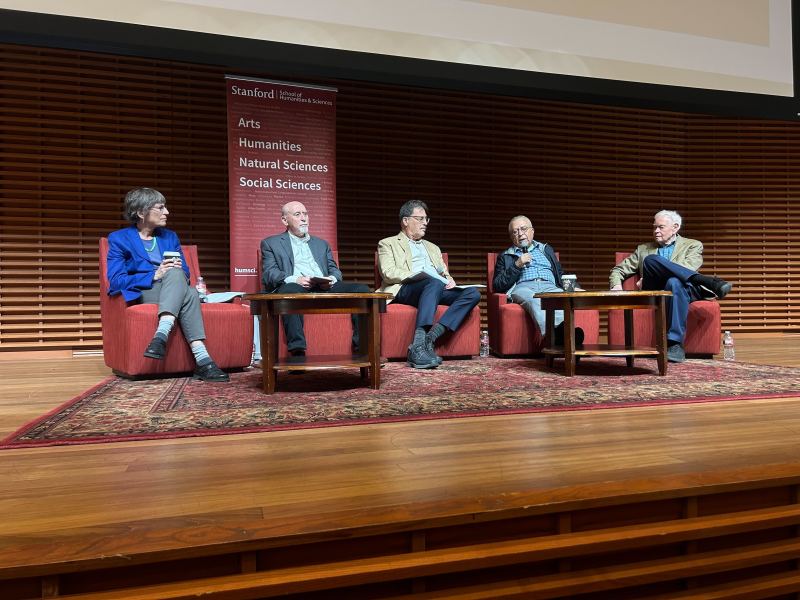Salam Fayyad, the former Prime Minister of the Palestinian National Authority, advised students to “disagree with passion, but get along pleasantly,” as he shared a stage with Israeli environmental politician and Tel Aviv University professor Alon Tal on Tuesday.
The public conversation, which was held at Cemex Auditorium, was moderated by Larry Diamond, Senior Fellow of Global Democracy at the Freeman Spogli Institute (FSI) for International Studies. It was the latest session of the PHIL 3: “Democracy and Disagreement” class taught by Debra Satz, Humanities and Sciences dean and Paul Brest, Stanford Law School interim dean.
Fayyad and Tal explored complex questions surrounding the ongoing Israel-Gaza war, such as the implications of the one-state versus two-state solution. The class also discussed Hamas’s ideology and their integration into Palestinian society, and the challenges to achieving regional peace and pluralism.
In an interview with The Daily, Fayyad said it was important to respect different perspectives and spoke to the importance of dialogue about contentious issues on college campuses.
Conversations should not “be about your narrative being wrong, mine being right, or vice versa,” he said. “Your truth is your truth, and I respect that you view it as such, and I expect reciprocal treatment. There is a way in which you can disagree without being disrespectful.”
Echoing Fayyad, Tal called on students to pursue more nuanced and intentional dialogue.
“What bothers me is that so much of the present protest conflates criticism of Israel with a fundamental anti-Zionist position, that says Israel has no right to exist from the river to the sea,” Tal said. He expressed concern about the current tone of protests on college campuses, where he said criticism of Israel often merges into anti-Zionist sentiment.
Pro-Palestine protestors often say “from the river to the sea, Palestine will be free,” a phrase that many pro-Israel people consider antisemitic. According to the Associated Press (AP), “what the phrase means depends on who is telling the story — and which audience is hearing it.” For some Jewish people, it implies a vision of an entirely Palestinian region from the Jordan River to the Mediterranean Sea, suggesting the elimination of Israel. For many Palestinians and pro-Palestine demonstrators, it is a call for peace and equality.
Although Tal agreed with certain criticisms of Israel and has actively pursued legal action against the Israeli government for environmental issues, he said he firmly opposes any denial of the legitimacy of the Jewish state.
“The rejection of the legitimacy of the Jewish state is a line that I find unacceptable, and I think that in the end, they do themselves a disservice because then their criticism comes across as being extremist and, ultimately, racist,” he said.
Tal also stressed that protests led by young people have had significant influence on shaping the Biden administration’s policies. “I don’t think that students should feel that their voices are unheard,” he said.
While Fayyad called on students to approach disagreement with civility, he also expressed concern about institutional responses to student activism.
Amid escalating protests on college campuses nationwide, including hundreds of arrests and several clashes between protestors and police, Fayyad expressed concern at the harsh response to demonstrations.
“The threshold [is] becoming very low for tolerating protest, and I don’t think that is healthy,” he said.
The moderated discussion was followed by session where students could pose questions directly to the speakers.
Viswajeeth Karthikeyan ’27 said he appreciated the Democracy and Disagreement lecture series for the structured discussions that it facilitates. “Discussing serious issues without rivalry and protest is crucial for fostering understanding, empathy, and progress,” he said.
Following the event, the Stanford Political Union (SPU) and Stanford Democracy Hub facilitated a student-led community discussion. Small, moderated groups discussed participants’ various opinions and perspectives on the ongoing war.
“Civic dialogue, in addition to other forms of expression, is a valuable way for those who care deeply or are deeply affected by the war in Gaza to share their opinions and perspectives, as well as hear and critically engage with the views of others,” said YuQing Jiang ’25, SPU president and a Daily editor.
“Our aim was not to have students reach any sort of consensus, but rather to develop a deep appreciation and understanding of why others hold the positions they do,” Jiang said.
